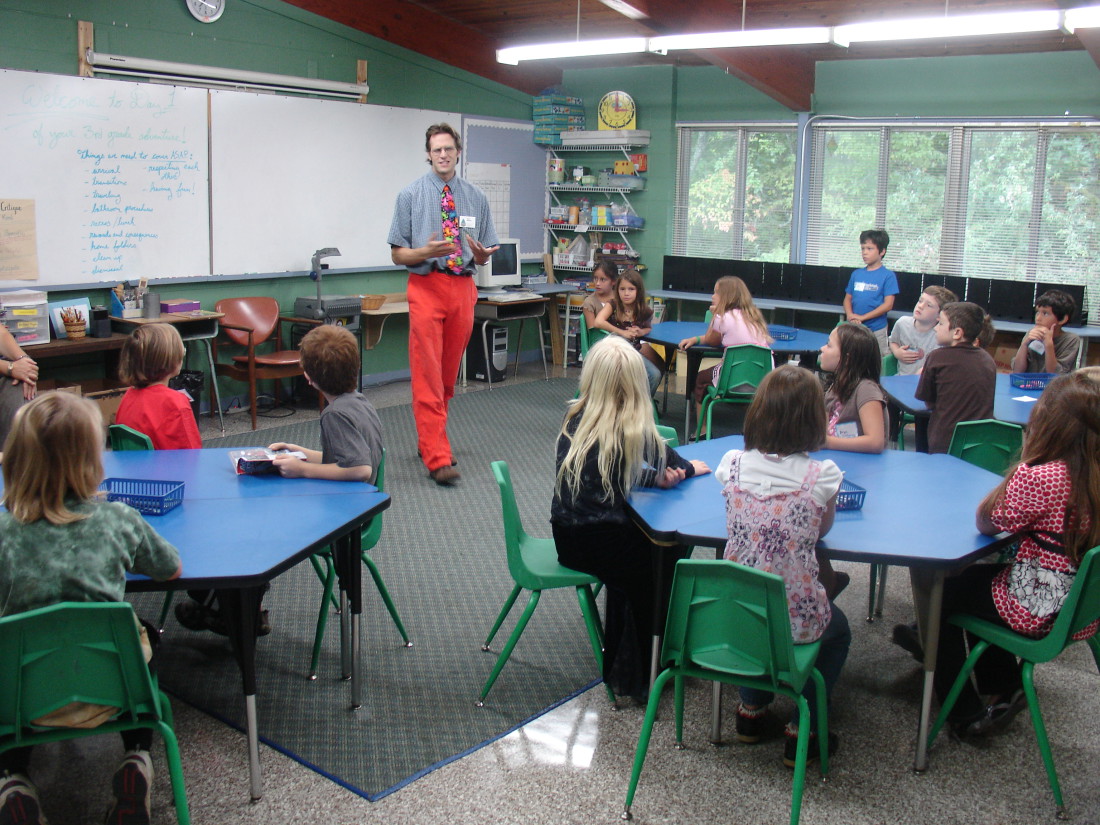Editor’s note: This article contains additional information not found in the print version released on May 3.
When seasoned teachers leave the classroom, everybody suffers. Students lose out on the benefits of the educators’ experience, school systems struggle to find and train replacements and the larger community often mourns the departure of a valued contributor with established relationships.
Western North Carolina has the second-lowest teacher turnover rate among the State Board of Education’s eight education districts. But teacher attrition here has been increasing steadily, and recent changes in state law have underscored the potential for both logistical and financial problems.
An unfunded state mandate requiring smaller classes in grades K-3 beginning this fall appeared to spell trouble for local schools, which were scrambling to hire additional educators. But Senate action last month gave school administrators more time to adjust, and lawmakers promised to “work on funding issues,” according to an April 25 press release from Sen. Phil Berger’s office.
Teachers who leave for reasons other than retirement cite many concerns, including excessive bureaucracy, high housing costs, meager pay, philosophical differences and other stressors. Because of its desirability, Asheville sees less turnover than some other areas, but the fundamental problems remain.
“The truth is, we live in a society, a country and, in particular, a state where the teaching profession isn’t adequately honored, either through financial compensation or otherwise,” asserts third-grade teacher Eben Heasley, who’s planning a career change after 15 years at Evergreen Community Charter School.
And when a veteran educator leaves, students pay a price. “I think I was not as good a teacher when I first started, and that affects students,” notes Heasley. “I did my best, but you just can’t replace experience.”
Moving on
“It’s been a long, strange, wonderful journey as a teacher at Evergreen,” Heasley began a recent letter to parents and colleagues explaining his decision. “At the end of this 2016-17 school year, it will be time for me to move on.”

With his son now entering college and his wife changing jobs, Heasley says he realized that teaching is no longer the right profession for him.
“If I could do the job in less than 50 hours a week, not have anything that I’m taking home beyond that, and be able to pursue other interests with a reasonable time span outside of school, then I probably would be making a different decision,” he explains. Besides the heavy amount of take-home work, Heasley cites the sheer number of tactical decisions teachers have to make throughout the day. He also remembers a tough financial call Evergreen’s board of directors had to make back in 2013, when he was serving on the board: Either cut teacher pay, lay off staff or increase class sizes.
And though he finds teaching intrinsically rewarding, Heasley believes the compensation should more accurately reflect the amount of time and stress involved. The veteran educators he’s worked with, notes Heasley, were masters at creating engaging lessons and giving students useful feedback.
Devalued
During the 2015-16 school year, 29 teachers left the Asheville City Schools; the Buncombe County Schools, a much larger system, lost 144. Three of the Asheville departures are now working in other North Carolina public school districts; the rest either left the profession altogether or are teaching in private schools or out of state.
According to figures from the N.C. Department of Public Instruction, however, teacher turnover in the city system has more than tripled in recent years, from about 5 percent during the 2010-11 school year to just over 17 percent by the end of 2014-15, and it continues to rise.
The vast majority of those leaving last year cited personal reasons, including retirement, moving to a nonpublic school in North Carolina, teaching in another state or making a total career change.
One key problem, however, is that “Legislators, at least in North Carolina, tend to give the impression that they don’t value teachers,” says Charlie Glazener, executive director of community relations and communications for the Asheville City Schools. This, he believes, contributes to the declining enrollment in teacher training programs across the state, which Glazener finds alarming. “All of these things add up in the minds of potential teachers. There’s the pay issue, and vouchers that take tax money and give it to religious schools.”
Less is more
Ironically, a recent effort by state lawmakers to improve classroom conditions also threatened to cause problems for Tar Heel educators. Beginning this fall, a state mandate passed without input from local school superintendents or other community leaders would have capped K-3 classes in public schools at 16-18 students, depending on the grade. And while smaller classes would improve educational quality and perhaps reduce teachers’ stress levels, schools would have had to find a way to pay for the additional staff and facilities needed without any increase in state funding.
In February, however, the House unanimously approved HB 13, which gave schools more flexibility in setting class sizes; in April, the Senate passed its version of the bill.
If the Senate hadn’t acted, the Asheville City Schools would have had to hire 13 additional teachers and 10 assistants this year, at a total cost of over $1 million, according to Interim Superintendent Bobbie Short. That figure doesn’t include the cost of adding classrooms: Before the reprieve, many other schools across North Carolina were considering such measures as cutting funding for the arts and/or physical education, adding costly modular classrooms or converting computer labs into classrooms. Now, however, the smaller classes won’t fully kick in until the 2018-19 school year, giving administrators more time to adjust or request a waiver.
Nonetheless, the city schools will have to hire five new teachers and two assistants this year to begin phasing in the state reduction requirements, Short told the Buncombe County commissioners during their May 2 meeting. That will cost about $355,000, and next year, the city system will have to hire an additional eight teachers, she said while presenting the system’s proposed budget and funding request for the 2017-18 school year.
The Buncombe County Schools will need only a few additional teachers this year, says Director of Human Resources Cynthia Lopez. But the system is “preparing for smaller class sizes in the 2018-19 school year by reviewing facilities and determining changes that will be necessary to accommodate more classrooms.” The class size mandate, she continues, “does raise financial concerns, especially if additional funding is not available to help pay for the additional teachers. … State government can assist in the teacher recruitment effort by raising teacher salaries. Local governments may also help by allocating funding for salary supplements.”
As of the 2015-16 school year, the average teacher supplement in the city schools was $3,951; in the county system, it was $3,721, according to the Department of Public Instruction. This additional money is provided by the county government in order to sweeten the pot. The state pays starting teachers with a bachelor’s degree about $35,000; after 14 years, the base salary reaches $43,250. Teacher pay tops out at $51,000 for those with 25 or more years of experience, not including local supplements.
“Luckily, the turnover rate in Asheville City is fairly low because of the area’s attractiveness and the high quality of life here,” says Glazener, adding, “We also pay a reasonably high supplement.”
Far from home
Another challenge to sustaining educational quality is the high cost of living in the city, which forces some local teachers to live farther from where they work. “We would love for teachers to be able to live in the communities they serve,” notes Kate Pett, executive director of the Asheville City Schools Foundation.
That’s particularly important, she maintains, in the city schools, which have a much more diverse student population than surrounding areas. “Students benefit from seeing themselves reflected in adult role models,” says Pett, but most of the system’s teachers are white. And though they’re encouraged to be aware of their charges’ diverse needs and backgrounds and use this knowledge to make education engaging and relevant, the “mismatch between teacher pay and increased housing prices” creates a further barrier.
A recent partnership involving the city and county schools, county government, the SECU Foundation and the Eblen Charities will provide workforce housing for Asheville and Buncombe County teachers. The 24-unit project on Erwin Hills Road is supposed to be completed this summer. Two-bedroom apartments are expected to rent for about $900 a month.
Meanwhile, to help head off teacher burnout, the Asheville City Schools Foundation trains teachers in mindfulness techniques and other strategies for collaborating and reducing stress. The foundation also tries to give them more of a say in which educational experiences they can offer their students. Through the Teaching Artists Presenting in Public Schools, or TAPAS, program, for example, teachers can apply for grants to bring artists into the classroom.
Greener grass
Teachers leaving local schools are often drawn to neighboring states that pay better, both Pett and Glazener say. In Georgia, for example, teachers can make as much as $10,000 more per year than in North Carolina and may get more raises. WNC teachers also leave to take more lucrative positions in Tennessee, Virginia and South Carolina.
Jan Galloway taught anatomy at Brevard High School for 14 years, but “As I looked at facing my last 10 years of working before retirement, I began to see how little North Carolina had to offer teachers, both financially and professionally.” She took a teaching job in Georgia last year. Multiple factors contributed to her decision, including a substantial pay raise.
The veteran educator also says she’s troubled by the increased emphasis on test scores and state report cards, which she feels is particularly true in North Carolina. Georgia, she believes, does a better job of seeing students as people and encouraging them to achieve their full human potential rather than focusing solely on academic performance.
“My life has been influenced by my teachers, all the way back to elementary school, and I wanted to give back to the profession,” Galloway explains. “I would like to think I’ve found a way to inspire some students to be the best they can be, as many of my teachers did for me.”
But North Carolina, she maintains, “needs to wake up before they lose their pick of the teachers.” And in this data-driven age, that’s true for some other states as well, says Galloway. “I think we’ll see huge changes in education across the nation in the next five or so years.”
New blood
Each year, notes Glazener, he and other city schools staffers visit college campuses and attend job fairs seeking to recruit new teachers. For the first three years, these new hires are paired with more experienced colleagues, who serve as mentors. UNC Asheville graduates can also get help from their former professors.
UNCA is one of 15 schools in the state university system that offer education programs leading to a North Carolina teacher’s license. But since the General Assembly discontinued the N.C. Teaching Fellows Program in 2011, every one of those training programs has seen its enrollment decline, Glazener points out. In exchange for four-year scholarships, program participants agreed to teach in North Carolina public schools for at least four years.
“When people leave the licensure program, the reasons are across the gamut,” says Brook Thompson, UNCA’s teacher recruitment and retention liaison. “Sometimes they’re feeling overwhelmed completing their major and education courses at the same time, or they figure out that they don’t really want to teach.” To encourage more local students to pursue teaching careers, the school is now partnering with Warren Wilson College. Beginning this fall, students who’ve completed their coursework at Warren Wilson will be able to enroll in UNCA’s licensure program.
An unusually high percentage of current program enrollees are older students: 27 percent already have a bachelor’s degree. And when seeking teaching jobs, notes Thompson, they’re more likely to remain in the area than more traditional students. Thanks to the university’s strong relationship with the Asheville City Schools as well as the systems in Buncombe, Henderson, McDowell and Transylvania counties, a higher percentage of these graduates end up working as teachers in WNC.
To encourage licensure candidates to stay the course, Thompson and other program staff try to keep them informed about scholarship and professional development opportunities. In addition, she helps organize events that give students opportunities to advocate for public education. Gov. Roy Cooper has said he’d like to revive the Teaching Fellows program, which Thompson says might also help reverse the decline in students choosing a career in teaching.
Positive support
In the meantime, however, Eben Heasley doesn’t know how he’s going to make a living next year, which he says is a little scary. “Teaching,” his letter notes, “is largely a labor of love, and I do not deny that there are fabulous inherent rewards provided to those who choose to engage in this work, but for me, at this point in my life, it’s not enough. It’s time to give space to other possibilities.”
Boosting teachers’ overall job satisfaction can help keep other veteran educators from following suit. Jeremy Gibbs, curriculum director for the Transylvania County Schools, says providing support for educators is a focus of his work. He tries to give school principals the information and resources they need to maintain an enjoyable, productive work environment for their teachers.

“Sometimes teachers can feel isolated in their classroom, so we encourage peer collaboration,” he explains. “We want to make school a great place not just for students but also for teachers, who are still growing and learning too.”
Although Gibbs says the system’s teachers are highly qualified, it’s a complex, high-stakes job, and he’s seen the applicant pool shrink in recent years.
“People look for stability — not in a boring sense, but [in terms of] ongoing support, which we try to give them. I hope this positive support transfers all the way up to state legislators, when they consider helping with support and funding.”






Might have been worth a mention that teachers have the kids for 185 days, have 9 teacher work days and have 10 leave days. That’s 184 work days.
Non teachers in full time jobs work 240 days per year, if they have 3 weeks vacation and get 5 paid holidays.
Those teacher salaries ought to have a * by them.
I left teaching a little over a year ago for an office job and have never been happier. I increased my salary by thousands and now sleep well through the night. The unexpected bonus is I lost 45 pounds when the stress of teaching was gone. People don’t talk enough about the incredible stress of teaching – you are at the whim of administrators, parents and even the students all for very little money. Life is too short for all that.
Teachers are not paid for the summer, it is a 10 month position. Most teachers have to worry about finding work in the summer or try to get a position teaching summer school, which is the best case scenario. Many teachers I know work another part time job in order to make it financially. Asheville is not an easy town to make it in as an educator financially by any means.
Both my mother and father taught in the Asheville City school system all their lives. During my early years, I remember that we were relatively poor and lived in West Asheville where we were not a lot better off than most of the blue collar working class who made up the large majority of people living in West Asheville then. Neither of my parents ever complained about the low pay, they just loved their work and were not doing it for money. As to the hours both of them put in long hours and my dad practically lived at the schools he taught at and did coaching jobs after school for extra money. I realize that we live in different times now and Asheville, especially West Asheville, is much more expensive , but there are still, I am sure, many who now work in the Asheville City public school system who do the work because , like my parents, they get their rewards when former students tell them years after that what they did as teachers changed their student’s lives.
I am working in the Asheville City School system, and I’m about to have a mental breakdown. I work 10-11 hours a day and bring home grading on the weekends. I haven’t had a day “off” since school started. I am working so hard because I am a good teacher who plans hands on meaningful lessons, but it is at the expense of my health and my personal life. Schools are way understaffed compared to what they were years ago, so although teachers always worked long hours, it is not like it is today.